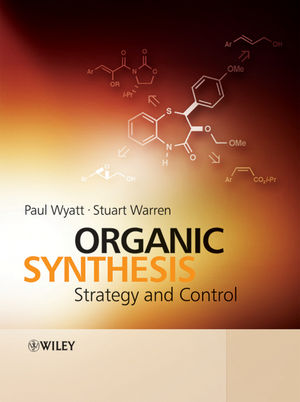Organic Synthesis: Strategy and ControlISBN: 978-0-471-48940-5
Hardcover
918 pages
June 2007
 This is a Print-on-Demand title. It will be printed specifically to fill your order. Please allow an additional 15-20 days delivery time. The book is not returnable.
Other Available Formats: Paperback
|
||||||
Preface.
A: Introduction: Selectivity.
1. Planning Organic Syntheses: Tactics, Strategy, andControl.
2. Chemoselectivity.
3. Regioselectivity: Controlled Aldol Reactions.
4. Stereoselectivity: Stereoselective AldolReactions.
5. Alternative Strategies for Enone Synthesis.
6. Choosing a Strategy : The Synthesis ofcyclopentenones.
B: Making Carbon-Carbon Bonds.
7. The Ortho Strategy for Aromatic Compounds.
8. delta-Complexes of Metals.
9. Controlling the Michael Reaction.
10. Specific Enol Equivalents.
11. Extended Enolates.
12. Allyl Anions.
13. Homoenolates.
14. Acyl Anion Equivalents.
C: Carbon-Carbon Double Bonds.
15. Synthesis of Double Bonds of DefinedStereochemistry.
16. Stereo-Controlled Vinyl Anion Equivalents.
17. Electrophilic Attack on Alkenes.
18. Vinyl Cations: Palladium-Catalysed C-CCoupling.
19. Allyl Alcohols: Allyl Cation Equivalents (andMore).
D: Stereochemistry.
20. Control of Stereochemistry -- Introduction.
21 Controlling Relative Stereochemistry.
22. Resolution.
23. The Chiral Pool.
24. Asymmetric Induction I: Reagent-Based Strategy.
25. Asymmetric Induction II: Asymmetric Catalysis:Formation of C-O and C-N Bonds.
26. Asymmetric Induction III: Asymmetric Catalysis:Formation of C-H and C-C Bonds.
27. Asymmetric Induction IV: Substrate-BasedStrategy.
28. Kinetic Resolution.
29. Enzymes: Biological Methods in AsymmetricSynthesis.
30. New Chiral Centres from Old --Enantiomerically Pure Compounds & SophisticatedSyntheses.
31. Strategy of Asymmetric Synthesis.
E: Functional Group Strategy.
32. Functionalisation of Pyridine.
33. Oxidation of Aromatic Compounds, Enols andEnolates.
34. Functionality and Pericyclic Reactions: NitrogenHeterocycles by Cycloadditions and Sigmatropic Rearrangements.
35. Synthesis and Chemistry of Azoles and otherHeterocycles with Two or more Heteroatoms.
36. Tandem Organic Reactions.
General References.
Index.
A: Introduction: Selectivity.
1. Planning Organic Syntheses: Tactics, Strategy, andControl.
2. Chemoselectivity.
3. Regioselectivity: Controlled Aldol Reactions.
4. Stereoselectivity: Stereoselective AldolReactions.
5. Alternative Strategies for Enone Synthesis.
6. Choosing a Strategy : The Synthesis ofcyclopentenones.
B: Making Carbon-Carbon Bonds.
7. The Ortho Strategy for Aromatic Compounds.
8. delta-Complexes of Metals.
9. Controlling the Michael Reaction.
10. Specific Enol Equivalents.
11. Extended Enolates.
12. Allyl Anions.
13. Homoenolates.
14. Acyl Anion Equivalents.
C: Carbon-Carbon Double Bonds.
15. Synthesis of Double Bonds of DefinedStereochemistry.
16. Stereo-Controlled Vinyl Anion Equivalents.
17. Electrophilic Attack on Alkenes.
18. Vinyl Cations: Palladium-Catalysed C-CCoupling.
19. Allyl Alcohols: Allyl Cation Equivalents (andMore).
D: Stereochemistry.
20. Control of Stereochemistry -- Introduction.
21 Controlling Relative Stereochemistry.
22. Resolution.
23. The Chiral Pool.
24. Asymmetric Induction I: Reagent-Based Strategy.
25. Asymmetric Induction II: Asymmetric Catalysis:Formation of C-O and C-N Bonds.
26. Asymmetric Induction III: Asymmetric Catalysis:Formation of C-H and C-C Bonds.
27. Asymmetric Induction IV: Substrate-BasedStrategy.
28. Kinetic Resolution.
29. Enzymes: Biological Methods in AsymmetricSynthesis.
30. New Chiral Centres from Old --Enantiomerically Pure Compounds & SophisticatedSyntheses.
31. Strategy of Asymmetric Synthesis.
E: Functional Group Strategy.
32. Functionalisation of Pyridine.
33. Oxidation of Aromatic Compounds, Enols andEnolates.
34. Functionality and Pericyclic Reactions: NitrogenHeterocycles by Cycloadditions and Sigmatropic Rearrangements.
35. Synthesis and Chemistry of Azoles and otherHeterocycles with Two or more Heteroatoms.
36. Tandem Organic Reactions.
General References.
Index.



